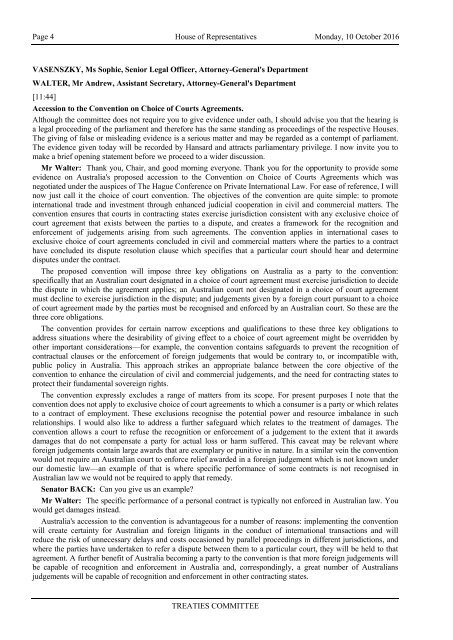Proof Committee Hansard
2d908Ic
2d908Ic
You also want an ePaper? Increase the reach of your titles
YUMPU automatically turns print PDFs into web optimized ePapers that Google loves.
Page 4 House of Representatives Monday, 10 October 2016<br />
VASENSZKY, Ms Sophie, Senior Legal Officer, Attorney-General's Department<br />
WALTER, Mr Andrew, Assistant Secretary, Attorney-General's Department<br />
[11:44]<br />
Accession to the Convention on Choice of Courts Agreements.<br />
Although the committee does not require you to give evidence under oath, I should advise you that the hearing is<br />
a legal proceeding of the parliament and therefore has the same standing as proceedings of the respective Houses.<br />
The giving of false or misleading evidence is a serious matter and may be regarded as a contempt of parliament.<br />
The evidence given today will be recorded by <strong>Hansard</strong> and attracts parliamentary privilege. I now invite you to<br />
make a brief opening statement before we proceed to a wider discussion.<br />
Mr Walter: Thank you, Chair, and good morning everyone. Thank you for the opportunity to provide some<br />
evidence on Australia's proposed accession to the Convention on Choice of Courts Agreements which was<br />
negotiated under the auspices of The Hague Conference on Private International Law. For ease of reference, I will<br />
now just call it the choice of court convention. The objectives of the convention are quite simple: to promote<br />
international trade and investment through enhanced judicial cooperation in civil and commercial matters. The<br />
convention ensures that courts in contracting states exercise jurisdiction consistent with any exclusive choice of<br />
court agreement that exists between the parties to a dispute, and creates a framework for the recognition and<br />
enforcement of judgements arising from such agreements. The convention applies in international cases to<br />
exclusive choice of court agreements concluded in civil and commercial matters where the parties to a contract<br />
have concluded its dispute resolution clause which specifies that a particular court should hear and determine<br />
disputes under the contract.<br />
The proposed convention will impose three key obligations on Australia as a party to the convention:<br />
specifically that an Australian court designated in a choice of court agreement must exercise jurisdiction to decide<br />
the dispute in which the agreement applies; an Australian court not designated in a choice of court agreement<br />
must decline to exercise jurisdiction in the dispute; and judgements given by a foreign court pursuant to a choice<br />
of court agreement made by the parties must be recognised and enforced by an Australian court. So these are the<br />
three core obligations.<br />
The convention provides for certain narrow exceptions and qualifications to these three key obligations to<br />
address situations where the desirability of giving effect to a choice of court agreement might be overridden by<br />
other important considerations—for example, the convention contains safeguards to prevent the recognition of<br />
contractual clauses or the enforcement of foreign judgements that would be contrary to, or incompatible with,<br />
public policy in Australia. This approach strikes an appropriate balance between the core objective of the<br />
convention to enhance the circulation of civil and commercial judgements, and the need for contracting states to<br />
protect their fundamental sovereign rights.<br />
The convention expressly excludes a range of matters from its scope. For present purposes I note that the<br />
convention does not apply to exclusive choice of court agreements to which a consumer is a party or which relates<br />
to a contract of employment. These exclusions recognise the potential power and resource imbalance in such<br />
relationships. I would also like to address a further safeguard which relates to the treatment of damages. The<br />
convention allows a court to refuse the recognition or enforcement of a judgement to the extent that it awards<br />
damages that do not compensate a party for actual loss or harm suffered. This caveat may be relevant where<br />
foreign judgements contain large awards that are exemplary or punitive in nature. In a similar vein the convention<br />
would not require an Australian court to enforce relief awarded in a foreign judgement which is not known under<br />
our domestic law—an example of that is where specific performance of some contracts is not recognised in<br />
Australian law we would not be required to apply that remedy.<br />
Senator BACK: Can you give us an example?<br />
Mr Walter: The specific performance of a personal contract is typically not enforced in Australian law. You<br />
would get damages instead.<br />
Australia's accession to the convention is advantageous for a number of reasons: implementing the convention<br />
will create certainty for Australian and foreign litigants in the conduct of international transactions and will<br />
reduce the risk of unnecessary delays and costs occasioned by parallel proceedings in different jurisdictions, and<br />
where the parties have undertaken to refer a dispute between them to a particular court, they will be held to that<br />
agreement. A further benefit of Australia becoming a party to the convention is that more foreign judgements will<br />
be capable of recognition and enforcement in Australia and, correspondingly, a great number of Australians<br />
judgements will be capable of recognition and enforcement in other contracting states.<br />
TREATIES COMMITTEE















